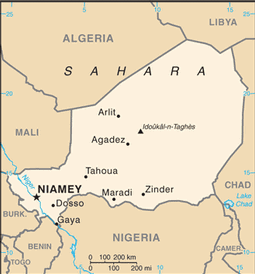Welcome to the Virtual Education Wiki ~ Open Education Wiki
Niger: Difference between revisions
| Line 42: | Line 42: | ||
=== Polytechnics in Niger=== | === Polytechnics in Niger=== | ||
=== Colleges in | === Colleges in Niger=== | ||
== Education reform == | == Education reform == | ||
Revision as of 11:44, 20 April 2011
author byline
Experts situated in Niger
Niger in a nutshell

Niger, officially the Republic of Niger, is a landlocked country in Western Africa, named after the Niger River. It borders Nigeria and Benin to the south, Burkina Faso and Mali to the west, Algeria and Libya to the north and Chad to the east.
Niger has a population of 16.4 million, mostly clustered in the far south and west of the nation. Its size is almost 1,270,000 km², making it the largest nation in West Africa,
The capital city is Niamey.
Niger is one of the poorest and least developed countries in the world, with over 80% of its territory covered by the Sahara desert, and much of the rest threatened by periodic drought and desertification. The economy is concentrated around subsistence and some export agriculture clustered in the more fertile south, and the export of raw materials—especially uranium ore. Niger remains handicapped by its landlocked position, poor education, infrastructure, health care, and environmental degradation.
Nigerien society reflects a great diversity drawn from the long independent histories of its several ethnic groups and regions and their relatively short period living in a single state. Historically, what is now Niger has been on the fringes of several large states.
The vast majority of the population practice Islam. A majority also live in rural areas, and have little access to advanced education.
The official language is French.
Education in Niger
School-level education
Further and Higher education
Universities in Niger
- Abdou Moumouni University in Niamey
- Islamic University of Niger in Say